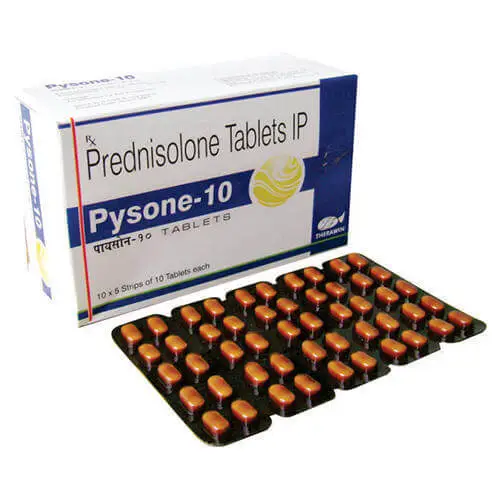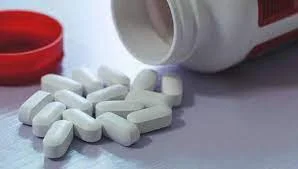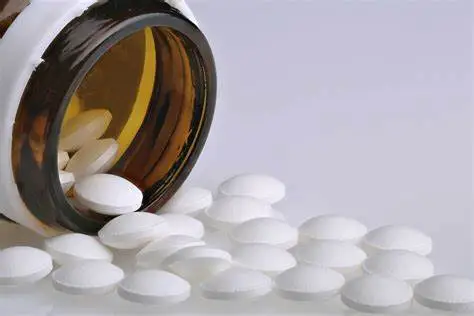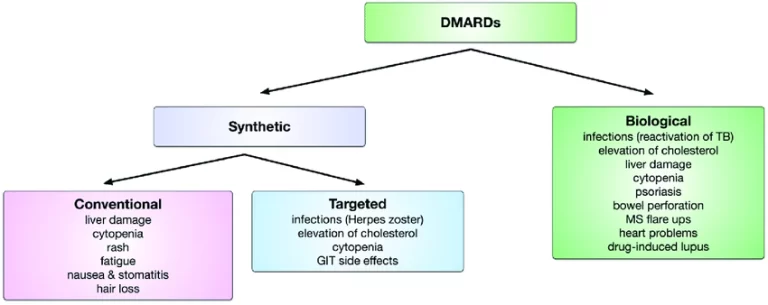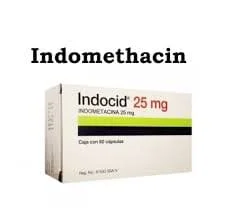Prednisolone: Uses, Interaction, and Mechanism of Action
Table of Contents
Introduction
Prednisolone is a synthetic corticosteroid drug that belongs to the glucocorticoid class. Corticosteroids are artificially produced forms of cortisol, a naturally occurring bodily substance. Prednisolone has anti-inflammatory, immunosuppressive, and anti-allergic properties, making it a versatile medication used to treat a variety of medical conditions.
Prednisone is an alternative medication that functions similarly to prednisolone in treating inflammatory conditions.
A corticosteroid called prednisolone can be used to lower inflammation and suppress an overactive immune system. It functions by imitating the effects of cortisol, a hormone that controls stress and metabolism and is secreted by the adrenal glands, which are situated above the kidneys. Prednisolone inhibits the release of substances by the body that cause inflammation.
Prednisolone primarily impacts our immune response and lowers inflammation; it does not alter the body’s mineralocorticoid activity, which is responsible for maintaining the proper balance of water and electrolytes.
Prednisolone was FDA-approved in 1955.
Generic Name: Prelone
Metabolism: Hepatic
Routes of administration: Intravenous, By mouth, Tropical, Eye drops
Excretion: Urine
Protein binding: 65-91%
Elimination half-life: 2-3.5 hours
AHFS/Drugs.com: Monograph
Chemical formula: C21H28O5
Brand name
Deltacortril
Deltastab
Dilacort
Indications:
Prednisolone is used to treat a variety of medical conditions due to its anti-inflammatory, immunosuppressive, and anti-allergic properties. Here are some common indications for prednisolone:
1. Inflammatory and Autoimmune Conditions:
Rheumatoid Arthritis: Prednisolone is used to reduce inflammation and manage symptoms in patients with rheumatoid arthritis.
Systemic Lupus Erythematosus (SLE): It may be prescribed to control inflammation in individuals with SLE.
2. Respiratory Conditions:
Asthma: Prednisolone can be used to manage acute exacerbations of asthma, especially when other treatments are not sufficient.
Chronic Obstructive Pulmonary Disease (COPD): In certain cases, prednisolone may be prescribed to reduce inflammation in the airways.
3. Allergic Reactions:
Allergic Rhinitis: Prednisolone may be used to relieve severe symptoms of allergic rhinitis when other treatments are ineffective.
Allergic Skin Conditions: It can be prescribed for the treatment of severe allergic skin reactions.
4. Dermatological Conditions:
Dermatitis and Eczema: Prednisolone is sometimes used to manage inflammation associated with dermatitis and eczema.
5. Inflammatory Bowel Disease (IBD):
Ulcerative Colitis and Crohn’s Disease: Prednisolone may be prescribed during flare-ups of these inflammatory bowel conditions.
6. Organ Transplantation:
Immunosuppression: Prednisolone, often in combination with other immunosuppressive drugs, may be used to prevent organ rejection after transplantation.
7. Certain Cancers:
Lymphomas and Leukemias: Prednisolone may be part of the treatment regimen for certain types of cancers, particularly lymphomas and leukemias.
8. Nephrotic Syndrome:
Minimal Change Disease and Focal Segmental Glomerulosclerosis (FSGS): Prednisolone is commonly used in the treatment of nephrotic syndrome associated with these kidney diseases.
9. Adrenal Insufficiency:
Addison’s Disease: In cases of adrenal insufficiency, prednisolone may be used as a replacement therapy to provide the body with the corticosteroid it lacks.
Mechanism of action
Prednisolone, like other corticosteroids, exerts its therapeutic effects through a complex mechanism of action involving various cellular and molecular processes. Here is an overview of the key aspects of the mechanism of action of prednisolone:
Anti-Inflammatory Effects:
Inhibition of Inflammatory Mediators: Prednisolone suppresses the synthesis and release of inflammatory mediators such as prostaglandins and leukotrienes. These substances play a crucial role in the initiation and propagation of the inflammatory response.
Inhibition of Proinflammatory Genes: Prednisolone acts on the genetic level by binding to glucocorticoid receptors in the cytoplasm of cells. This glucocorticoid-receptor complex then translocates to the cell nucleus, where it modulates the transcription of proinflammatory genes, reducing the production of cytokines and other inflammatory molecules.
Immunosuppressive Effects:
Suppression of Immune Response: Prednisolone dampens the activity of immune cells, particularly T lymphocytes. This immunosuppressive effect is beneficial in conditions where an overactive immune response contributes to disease, such as autoimmune disorders or organ transplantation.
Reduction of Antibody Production: Prednisolone can also inhibit the production of antibodies by B lymphocytes, which is relevant in autoimmune conditions and conditions where an excessive immune response needs to be controlled.
Stabilization of Cell Membranes:
Stabilization of Cellular Membranes: Prednisolone can stabilize cellular membranes by inhibiting the release of phospholipases. This action contributes to the overall reduction of inflammation and tissue damage.
Metabolic Effects:
Glucose Metabolism: Prednisolone influences glucose metabolism by promoting gluconeogenesis (production of glucose from non-carbohydrate sources) and inhibiting glucose uptake by cells. This can lead to increased blood glucose levels, making it important to monitor blood sugar levels in individuals taking prednisolone.
Salt and Water Balance:
Sodium Retention: Prednisolone can lead to sodium retention and potassium excretion, affecting electrolyte balance. This effect is relevant in conditions such as edema and fluid retention.
Anti-Allergic Effects:
Inhibition of Allergic Reactions: Prednisolone can reduce the severity of allergic reactions by suppressing the release of histamine and other mediators from mast cells.
Pharmacokinetics
- Absorption
Route of Administration: Prednisolone can be administered orally, intravenously, intramuscularly, or topically. Taking medication orally is the most popular method.
Oral Bioavailability: Prednisolone is well-absorbed from the gastrointestinal tract after oral administration. The bioavailability is variable and can be influenced by factors such as food and individual patient characteristics. - Distribution
Plasma Protein Binding: Prednisolone binds extensively to plasma proteins, primarily albumin. This binding affects its distribution in the bloodstream and to various tissues.
Tissue Distribution: Prednisolone is distributed to tissues throughout the body, including the liver, kidneys, lungs, and muscles. It is also able to pass through the blood-brain barrier. - Metabolism
Liver Metabolism: Prednisolone undergoes extensive metabolism in the liver, primarily through the cytochrome P450 enzyme system. It is converted to prednisone, and vice versa, with prednisone being less active than prednisolone.
Interconversion: The interconversion between prednisolone and prednisone is a significant aspect of the drug’s pharmacokinetics. - Elimination
Excretion: Prednisolone and its metabolites are primarily excreted in the urine, with a small amount excreted in the feces.
Half-Life: The elimination half-life of prednisolone is relatively short, ranging from 2 to 4 hours. This short half-life contributes to the need for multiple daily dosing in certain therapeutic regimens.
Renal and Hepatic Elimination: Both renal and hepatic (liver) clearance play roles in the elimination of prednisolone from the body.
Pharmacodynamics
Prednisolone, a glucocorticoid, interacts with its corresponding glucocorticoid receptor (GCR) in the cytoplasm after passing easily through the cell membrane thanks to its lipophilic nature. The glucocorticoid receptor’s chaperone proteins dissociate from the GC/GCR complex upon engagement, allowing the complex to translocate inside the nucleus. After binding, this process takes place in 20 minutes.
After entering the nucleus, the homodimer GC/GCR complex attaches itself to particular DNA binding sites called glucocorticoid response elements (GREs), which either increases or decreases the production of a gene. Anti-inflammatory proteins are synthesized when complexes bind to positive GREs and prevent the transcription of inflammatory genes when they bind to negative GREs.
They increase anti-inflammatory signals like the interleukin-10 gene and prevent the production of signals that promote inflammation including nuclear factor-Kappa B (NF-κB), Activator protein 1 (AP-1), and nuclear factor of activated T-cells (NFAT). When combined, they will result in a series of actions that will suppress the production of prostaglandins and other inflammatory mediators. Moreover, demargination and neutrophil cell death are inhibited by glucocorticoids. Moreover, phospholipase A2 reduces the synthesis of arachidonic acid derivatives.
Functions of prednisolone
Prednisolone, a synthetic corticosteroid, exerts various functions in the body, primarily due to its anti-inflammatory, immunosuppressive, and metabolic effects. Here are the main functions of prednisolone:
Anti-Inflammatory Effect:
Inhibition of Inflammatory Mediators: Prednisolone suppresses the production and release of inflammatory mediators, such as prostaglandins and leukotrienes. This helps to reduce inflammation and alleviate symptoms associated with inflammatory conditions.
Modulation of Gene Expression: Prednisolone binds to glucocorticoid receptors in the cytoplasm of cells, and the resulting complex translocates to the nucleus. In the nucleus, it can modulate the transcription of genes involved in the inflammatory response, leading to an overall reduction in the production of inflammatory proteins.
Immunosuppressive Effect:
Suppression of Immune Response: Prednisolone inhibits the activity of immune cells, particularly T lymphocytes. This immunosuppressive effect is beneficial in conditions where an overactive immune system contributes to disease, such as autoimmune disorders or organ transplantation.
Reduction of Antibody Production: Prednisolone can inhibit the production of antibodies by B lymphocytes, contributing to its immunosuppressive properties.
Metabolic Effects:
Glucose Metabolism: Prednisolone influences glucose metabolism by promoting gluconeogenesis (the production of glucose from non-carbohydrate sources) and inhibiting glucose uptake by cells. This can lead to increased blood glucose levels, and it may necessitate monitoring in individuals with or at risk for diabetes.
Protein Metabolism: Prednisolone affects protein metabolism, leading to muscle wasting in some cases. This is one reason why long-term use of corticosteroids may have adverse effects on muscle tissue.
Salt and Water Balance:
Sodium Retention: Prednisolone can lead to sodium retention and potassium excretion, influencing electrolyte balance. This effect is relevant in conditions such as edema and fluid retention.
Anti-Allergic Effect:
Inhibition of Allergic Reactions: Prednisolone can reduce the severity of allergic reactions by suppressing the release of histamine and other mediators from mast cells.
Anti-Proliferative Effect:
Inhibition of Cell Proliferation: Prednisolone can inhibit the proliferation of certain cells, which is relevant in the treatment of certain cancers, particularly lymphomas and leukemias.
Anti-Shock Effect:
Management of Septic Shock: In some cases of septic shock, prednisolone may be used to modulate the inflammatory response and improve hemodynamic stability.
How should I take prednisolone?
Adhere to your doctor’s prescription for prednisolone exactly. Occasionally, your doctor may alter your dosage. Prednisolone should not be used in greater or lesser amounts or for longer than is advised.
Sometimes people take prednisolone every other day. Pay close attention to your doctor’s dosage instructions.
Using the included dosing syringe, a dose-measuring spoon, or a medicine cup, measure liquid medication. If you do not already have a dose-measuring device, ask your pharmacist for one.
Just before measuring a dose, you might need to give the oral suspension (liquid) a good shake. As directed by the label on your medication.
Until you’re ready to take the medication, keep the prednisolone disintegrating tablets in their blister packaging. Peel back the foil from the tablet blister after opening the package with dry hands; do not push the tablet through the foil. Please take out the tablet and hold it to your lips. Chew-free the disintegrating tablet, letting it dissolve in your mouth. While the tablet dissolves, swallow it several times. You can sip on some liquid if you’d like to aid in swallowing the dissolved tablet.
If you experience unusual stress—such as a severe illness, fever, or infection—or undergo surgery or experience a medical emergency, your dosage requirements may alter. Inform your doctor of any such circumstance that you may be affected by.
Certain medical tests may yield unexpected results when prednisolone is used. Inform any medical professional treating you that you take prednisolone.
Prednisolone shouldn’t be stopped abruptly. As you reduce your dosage, adhere to your doctor’s instructions.
How long does it take to work?
The onset of action of prednisolone can vary depending on the specific medical condition being treated, the formulation of the medication, and individual patient factors. In some cases, patients may experience relief from symptoms relatively quickly, while in other situations, it may take a longer period for the full therapeutic effects to be realized.
Here are some general considerations for the onset of action of prednisolone in common conditions:
Inflammatory Conditions:
Acute Conditions: In acute inflammatory conditions, such as asthma exacerbations or allergic reactions, patients may experience relief within a few hours to a day after starting prednisolone.
Chronic Conditions: For chronic inflammatory conditions like rheumatoid arthritis or inflammatory bowel disease, it may take several days to weeks for the full anti-inflammatory effects to be observed.
Autoimmune Conditions:
Systemic Lupus Erythematosus (SLE): Prednisolone may start to improve symptoms within days, but the full therapeutic effects may take weeks.
Dermatological Conditions:
Dermatitis or Eczema: Relief from itching and inflammation in skin conditions may occur within a few days of prednisolone treatment.
Organ Transplantation:
Immunosuppression: In the context of organ transplantation, prednisolone is often used as part of an immunosuppressive regimen. Its effects on preventing organ rejection may take longer to become apparent.
It’s important to note that the dosage and duration of prednisolone treatment are crucial factors in determining the speed of response. Higher doses are often used initially in acute situations, followed by a tapering schedule for chronic conditions.
Individual responses to prednisolone can also vary, and some patients may experience relief more quickly than others. Additionally, the overall management of a medical condition may involve a combination of medications, lifestyle modifications, and other therapeutic interventions.
What are the adverse effects of prednisolone?
Prednisolone, like other corticosteroids, can have a range of adverse effects, particularly with prolonged use or high doses. It’s crucial to remember that each person may experience these side effects differently in terms of their frequency and severity. Here are some common adverse effects associated with prednisolone:
Immunosuppression:
Increased Susceptibility to Infections: Prednisolone suppresses the immune system, making individuals more susceptible to infections. This can include bacterial, viral, fungal, or parasitic infections.
Metabolic Effects:
Hyperglycemia: Prednisolone can elevate blood glucose levels, leading to hyperglycemia. This effect is particularly relevant for individuals with diabetes or those at risk of developing diabetes.
Weight Gain: Long-term use of prednisolone can lead to increased appetite and weight gain, often due to fluid retention and changes in fat distribution.
Musculoskeletal Effects:
Osteoporosis: Prolonged use of prednisolone can contribute to bone loss and increase the risk of osteoporosis and fractures.
Muscle Wasting: Prednisolone can lead to the breakdown of muscle tissue, contributing to muscle weakness and wasting.
Gastrointestinal Effects:
Peptic Ulcers and Gastritis: Prednisolone can increase the risk of developing peptic ulcers and gastritis, especially when taken for an extended period.
Increased Appetite: Some individuals may experience increased appetite, potentially leading to overeating and weight gain.
Cardiovascular Effects:
Hypertension: Long-term use of prednisolone can contribute to an increase in blood pressure.
Fluid Retention: Prednisolone can cause fluid retention, leading to edema (swelling) in various parts of the body.
Psychological Effects:
Mood Changes: Some individuals may experience mood swings, anxiety, or irritability while taking prednisolone.
Insomnia: One of the side effects may be difficulty falling asleep.
Ophthalmic Effects:
Cataracts: Long-term use of corticosteroids, including prednisolone, has been associated with an increased risk of cataract formation.
Glaucoma: Prolonged use may also contribute to an increased risk of developing glaucoma.
Dermatological Effects:
Skin Thinning: Topical or prolonged systemic use can lead to thinning of the skin and increased susceptibility to bruising.
Delayed Wound Healing: Corticosteroids can impair the normal wound-healing process.
It’s crucial for individuals taking prednisolone to be closely monitored by healthcare professionals. The decision to use prednisolone involves a careful assessment of the potential benefits and risks, and the medication should be prescribed at the lowest effective dose for the shortest duration necessary. Abruptly stopping prednisolone without proper tapering can also lead to withdrawal symptoms and a flare-up of the underlying condition. Individuals should report any new or worsening symptoms to their healthcare provider promptly.
Drug-drug interaction:
Nonsteroidal Anti-Inflammatory Drugs (NSAIDs): Concurrent use of NSAIDs with prednisolone can increase the risk of gastrointestinal ulcers and bleeding. Both drugs have the potential to cause stomach irritation, and the combination may exacerbate this effect.
Anticoagulants (e.g., Warfarin): Prednisolone can enhance the effects of anticoagulants, leading to an increased risk of bleeding. Monitoring of clotting times may be necessary, and adjustments to the anticoagulant dosage may be required.
Antidiabetic Agents (e.g., Insulin, Oral Hypoglycemics): Prednisolone can elevate blood glucose levels, which may necessitate adjustments to antidiabetic medications. Patients with diabetes need to keep a careful eye on their blood sugar levels.
Vaccines: The immunosuppressive effects of prednisolone may reduce the effectiveness of vaccines. Live vaccines are generally contraindicated during prednisolone treatment due to the risk of inadequate immune response.
Certain Antibiotics (e.g., Rifampin): Rifampin may increase the metabolism of prednisolone, potentially reducing its effectiveness. Adjustments to the prednisolone dosage may be necessary if these drugs are used together.
Antifungal Medications (e.g., Ketoconazole): Ketoconazole and other antifungal drugs may increase the concentration of prednisolone in the body, leading to an increased risk of prednisolone-related side effects. Dose adjustments may be needed.
Certain Anticonvulsants (e.g., Phenobarbital, Phenytoin): These medications may increase the metabolism of prednisolone, potentially reducing its effectiveness. Close monitoring and adjustments to prednisolone dosage may be required.
Immunosuppressant Drugs (e.g., Cyclosporine, Tacrolimus): Concurrent use with other immunosuppressant medications may increase the risk of immunosuppression-related complications. Careful monitoring and dose adjustments may be needed.
Contraindications
It’s important to note that contraindications can vary based on the individual’s specific medical condition, so always consult with a healthcare professional for personalized advice. Here are some general contraindications for prednisolone:
Hypersensitivity or Allergy: Individuals who have a known hypersensitivity or allergy to prednisolone or any of its components should not use the medication.
Systemic Fungal Infections: Prednisolone is immunosuppressive and can mask or exacerbate systemic fungal infections. It is generally contraindicated in the presence of untreated systemic fungal infections.
Live Vaccines: The use of live vaccines is usually contraindicated during prednisolone treatment due to the risk of inadequate immune response. Consult with your healthcare provider about appropriate vaccination schedules.
Certain Infections: Prednisolone can suppress the immune system, making the body more susceptible to infections. It is generally contraindicated in the presence of certain active infections, such as tuberculosis unless specific anti-infective therapy is administered concurrently.
Peptic Ulcer Disease: Prednisolone can increase the risk of gastrointestinal ulcers and bleeding. It is generally contraindicated in individuals with active peptic ulcer disease.
Varicella (Chickenpox) and Measles: Prednisolone may worsen outcomes in individuals with varicella or measles. It is generally contraindicated in people with these infections.
Viral Infections (Herpes Simplex, Herpes Zoster): Prednisolone can exacerbate viral infections. It is generally contraindicated in individuals with active herpes simplex or herpes zoster (shingles) infections.
Vaccination with Live Attenuated Vaccines: Live attenuated vaccines (e.g., MMR – measles, mumps, rubella) are generally contraindicated during prednisolone treatment due to the risk of an inadequate immune response.
Monitoring
Regular monitoring of patients taking prednisolone is important to evaluate its effectiveness and to manage any potential side effects or complications.
Clinical Assessment: Regular clinical assessments are crucial to evaluate the response to prednisolone therapy. Monitoring for improvements in symptoms and signs of the underlying condition is important.
Dosage Adjustment: The healthcare provider may adjust the prednisolone dosage based on the patient’s response and any observed side effects. Dosage adjustments should be made gradually to minimize the risk of adrenal insufficiency.
Laboratory Monitoring:
Blood Glucose Levels: Regular monitoring of blood glucose levels is important, especially in individuals with or at risk of diabetes, as prednisolone can cause elevated blood sugar.
Electrolyte Levels: Periodic monitoring of electrolytes, particularly potassium, may be necessary, as prednisolone can lead to electrolyte imbalances.
Complete Blood Count (CBC): Regular CBC monitoring can help detect changes in white blood cell count, red blood cell count, and platelet count.
Bone Density Assessment:
Long-term use of prednisolone can lead to bone loss and increased risk of fractures. Bone density assessments may be recommended, especially in individuals at higher risk of osteoporosis.
Eye Examinations:
Individuals using prednisolone for extended periods may be advised to have regular eye examinations, as prolonged corticosteroid use can increase the risk of cataracts and glaucoma.
Monitoring for Adrenal Insufficiency:
Abrupt discontinuation of prednisolone after prolonged use can lead to adrenal insufficiency. Therefore, gradual tapering of the dose is often recommended under the guidance of a healthcare professional.
Monitoring for Infections:
Prednisolone suppresses the immune system, increasing the risk of infections. Monitoring for signs of infection is crucial, and individuals on prednisolone should promptly report any symptoms of infection to their healthcare provider.
Blood Pressure Monitoring:
Regular monitoring of blood pressure is important, as prednisolone can lead to hypertension.
What should I know regarding the storage and disposal of this prednisolone?
Prednisolone tablets should be kept at room temperature and away from light, heat, and moisture (i.e., not in the bathroom).
Keep all medicines out of reach of children.
In what circumstances should I check with my doctor before taking prednisolone?
It’s important to consult with your doctor, if you have specific medical conditions, are taking other medications, or have a history of certain health issues. Here are circumstances in which you should check with your doctor before taking prednisolone:
Current Medical Conditions:
Inform your doctor about any existing health conditions, including diabetes, hypertension, peptic ulcer disease, osteoporosis, glaucoma, or psychiatric disorders.
Discuss any history of infections, particularly tuberculosis or fungal infections.
Medication History:
Provide a comprehensive list of all medications you are currently taking, including prescription drugs, over-the-counter medications, supplements, and herbal products.
Inform your doctor if you are taking medications such as anticoagulants, antidiabetic drugs, immunosuppressants, or other corticosteroids.
Allergies:
If you have a known allergy or hypersensitivity to prednisolone or any of its components, inform your doctor.
Pregnancy and Breastfeeding:
If you are pregnant, planning to become pregnant, or breastfeeding, discuss the potential risks and benefits of prednisolone with your healthcare provider.
Recent Vaccinations:
Discuss recent vaccinations with your doctor, as live vaccines are generally contraindicated during prednisolone treatment.
Infections:
Report any current or recent infections to your doctor, as prednisolone can suppress the immune system.
Liver or Kidney Disease:
If you have liver or kidney disease, prednisolone may require dosage adjustments or careful monitoring.
History of Mental Health Issues:
If you have a history of mental health disorders, discuss this with your doctor, as prednisolone can have psychiatric side effects.
Eye Problems:
Inform your doctor if you have a history of eye problems, such as glaucoma or cataracts.
Osteoporosis Risk:
If you are at risk of osteoporosis or have a history of bone fractures, your doctor may consider measures to protect bone health during prednisolone treatment.
Always follow your doctor’s recommendations regarding the use of prednisolone. They will assess your health profile, consider potential interactions, and tailor the treatment plan to meet your specific needs. Never alter your medication schedule or self-prescribe without first speaking with your healthcare provider. Regular communication with your doctor is key to ensuring the safe and effective use of prednisolone.
Can prednisolone drug cause allergic reactions?
Yes, prednisolone can cause allergic reactions in some individuals. Allergic reactions to medications can vary in severity and may include symptoms such as:
Skin Rash or Hives: This can present as red, itchy welts or raised areas on the skin.
Swelling: Allergic reactions can cause swelling, particularly of the face, lips, or tongue.
Itching: Individuals may experience intense itching, often accompanied by the appearance of a rash.
Shortness of Breath: Severe allergic reactions may lead to difficulty breathing or shortness of breath.
Anaphylaxis: Anaphylaxis is an extremely serious allergic reaction that can be fatal in rare circumstances. Symptoms may include difficulty breathing, a rapid or weak pulse, a drop in blood pressure, and loss of consciousness.
If you suspect an allergic reaction to prednisolone or any medication, seek medical attention immediately. It’s essential to discontinue the medication and inform your healthcare provider about your symptoms.
It’s worth noting that while prednisolone itself can cause allergic reactions, some individuals may be allergic to other components in the medication, such as certain preservatives or additives. If you have a known allergy to prednisolone or any of its components, inform your healthcare provider before starting the medication.
If you experience any signs of an allergic reaction while taking prednisolone, do not continue the medication without consulting your doctor. They can assess the situation, provide guidance, and recommend alternative treatments if necessary. In some cases, a healthcare provider may prescribe an alternative corticosteroid or explore other options based on your medical history and individual needs.
Symptoms of overdose
An overdose of prednisolone, or any corticosteroid, can lead to various symptoms. It is important to get medical help right away if you think someone may have overdosed. The symptoms of a prednisolone overdose can vary depending on factors such as the amount ingested, individual sensitivity, and the duration of exposure. Here are potential symptoms associated with a prednisolone overdose:
Adrenal Insufficiency:
Sudden discontinuation or an overdose of prednisolone can suppress the adrenal glands, leading to symptoms such as weakness, fatigue, dizziness, nausea, and low blood pressure.
Hyperglycemia:
Elevated blood glucose levels result in symptoms like increased thirst, frequent urination, and blurred vision.
Fluid and Electrolyte Imbalance:
Sodium retention, potassium loss, and fluid retention may cause symptoms such as edema, hypertension, and electrolyte disturbances.
Gastrointestinal Issues:
Increased risk of gastrointestinal ulcers, bleeding, and perforation, which may manifest as abdominal pain, vomiting blood, or black, tarry stools.
Psychiatric Effects:
Mood swings, irritability, anxiety, and insomnia are possible psychological symptoms.
Cushingoid Features:
Prolonged exposure to high doses may lead to symptoms resembling Cushing’s syndrome, including moon face, central obesity, and a hump between the shoulders.
Osteoporosis and Bone Fractures:
Long-term use or high doses may increase the risk of bone loss and fractures.
Infections:
Suppression of the immune system can result in an increased susceptibility to infections, and symptoms may include fever, chills, or persistent infections.
Hypertension:
Elevated blood pressure may occur due to fluid retention and increased vascular sensitivity.
If you or someone else may have taken an overdose of prednisolone, it’s important to contact emergency services or your local poison control center immediately. Do not wait for symptoms to worsen. Prompt medical attention is essential to assess the severity of the overdose and provide appropriate treatment.
What should I do if I forget a dose of the prednisolone drug?
If you forget to take a dose of prednisolone, here are some general guidelines to follow:
If you realize you missed a dose and it is not almost time for your next scheduled dose, take the missed dose as soon as you remember.
Don’t take the missed dose if the next one is almost due:
If your next dose is almost due, skip the missed one and go back to your usual dosing schedule. Never take two doses at once to make up for one that you missed.
Avoid Taking Extra Doses:
Never take two doses to make up for one that you missed. Taking more prednisolone than prescribed can increase the risk of side effects and complications.
Notify Your Healthcare Provider:
If you frequently forget doses or have difficulty adhering to your medication schedule, it’s essential to inform your healthcare provider. They can guide strategies to help you remember and may adjust your treatment plan if needed.
Maintain a Medication Schedule:
Consider setting up a routine or using tools such as pill organizers or medication reminder apps to help you stay on schedule with your prednisolone doses.
It’s crucial to follow your healthcare provider’s instructions regarding the use of prednisolone. If you have specific concerns about a missed dose or if you are unsure about what to do, contact your healthcare provider or pharmacist for guidance. Based on your medical history and the particulars of your treatment plan, they can offer you tailored advice.
Precautions to take when using prednisolone drug?
When using prednisolone, it’s important to take certain precautions to ensure the medication’s safe and effective use. Here are some key precautions to consider:
Follow Prescribed Dosage:
Simply follow your doctor’s instructions when taking prednisolone. Without first speaking with your doctor, never reduce the dosage or stop taking the medication.
Take with Food or Milk:
Taking prednisolone with food or milk can help minimize stomach upset. Follow your healthcare provider’s instructions regarding the timing of doses with meals.
Notify Your Healthcare Provider:
Tell your doctor about all of the medications you take now, including over-the-counter, prescription, and dietary supplements. By doing this, possible drug interactions are avoided.
Report Any Side Effects:
As soon as you notice any strange or severe side effects, let your doctor know. This includes changes in mood, vision problems, persistent stomach pain, or signs of infection.
Monitor Blood Glucose Levels:
If you have diabetes, monitor your blood glucose levels regularly, as prednisolone can increase blood sugar levels. Your healthcare provider may need to adjust your diabetes medications.
Bone Health:
Long-term use of prednisolone can lead to bone loss and an increased risk of fractures. Discuss with your healthcare provider strategies to maintain bone health, including adequate calcium and vitamin D intake.
Regular Checkups:
Attend regular checkups with your healthcare provider. They will monitor your response to prednisolone, assess for potential side effects, and make any necessary adjustments to your treatment plan.
Eye Examinations:
Long-term use of corticosteroids can increase the risk of cataracts and glaucoma. Regular eye examinations may be recommended, especially if you are on prednisolone for an extended period.
Vaccinations:
Consult your healthcare provider regarding vaccinations. Live vaccines are generally contraindicated during prednisolone treatment, and the timing of other vaccinations may need consideration.
Avoid Alcohol and NSAIDs:
Limit alcohol intake, as alcohol can increase the risk of stomach irritation. Additionally, the use of nonsteroidal anti-inflammatory drugs (NSAIDs) with prednisolone may increase the risk of gastrointestinal ulcers and bleeding.
Pregnancy and Breastfeeding:
If you are pregnant, planning to become pregnant, or breastfeeding, discuss the potential risks and benefits of prednisolone with your healthcare provider.
Always communicate openly with your healthcare provider about any concerns or questions you may have regarding prednisolone. They can provide guidance tailored to your specific health needs and help you navigate the potential risks and benefits of the medication.
FAQs
The medications dexamethasone, prednisone, and prednisolone aid in lowering swelling and inflammation in the respiratory tract. If your child has asthma or has difficulty breathing, coughing, or wheezing, they might need to take these medications for a few days.
Since oral steroids do not lessen the duration or severity of symptoms, they should not be used to treat acute lower respiratory tract infections, also known as “chest infections,” in adults without asthma or other chronic lung diseases.
Prednisolone should be taken with breakfast to avoid stomach distress. Prednisolone is less likely to interfere with your sleep if you take it in the morning. You can take your prednisolone tablets with or without food as long as you swallow them whole, even if they are labeled as “enteric coated” or “gastro resistant”.
When taking prednisolone, it is safe to take codeine and paracetamol for pain. Avoid alcoholic beverages when taking prednisolone.
Prednisone treatment resulted in increases in plasma creatinine concentration and urinary creatinine excretion, indicating that prednisone 60 mg/day continues to have a catabolic effect even after two weeks of treatment.

